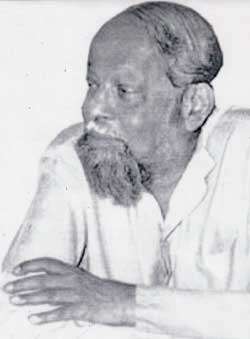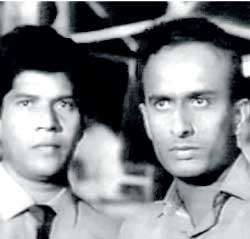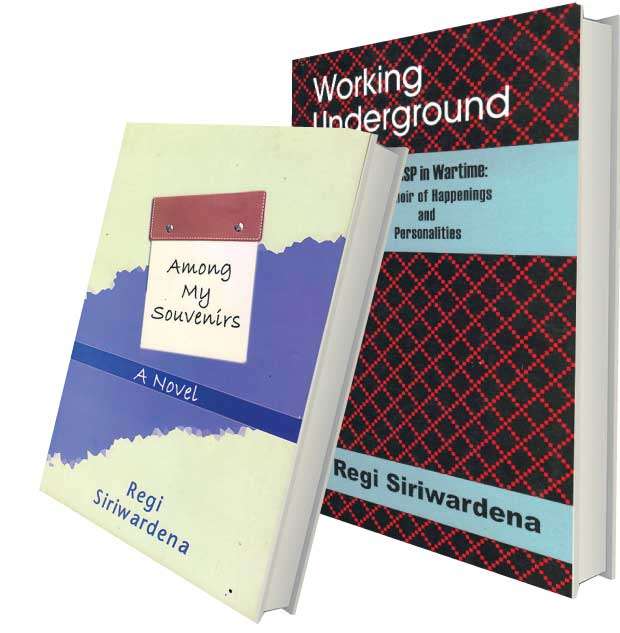Reply To:
Name - Reply Comment
Last Updated : 2024-04-26 06:07:00
Tissa Abeysekara knew Regi Siriwardena. It was Regi who inducted Tissa into the cinema, when, aboard Lester James Peries’s Gamperaliya, he pointed at him and suggested that he write the

dialogues for the script. This was reasonable, given that neither Regi nor Tissa was adequate to the task of writing in Sinhala. In any case, two days after the suggestion was made and approved, Tissa went to meet his benefactor at his residence in Elibank Road, along Havelock Town, where for hours and hours, the two talked about Chitrasena and Dylan Thomas. As the day drew to its end though, Tissa suddenly remembered that he was expected to be present at a LSSP Youth League in his hometown, Egodawatta, for the simple reason that he was its Secretary. The rift between Dylan Thomas and revolutionary politics, for Tissa at least, seemed virtually unbridgeable, so it was with some hesitation that he excused himself.
The reply he got was beyond what he expected; his benefactor had not only been in the LSSP, he had also been in the Central Committee during the Second World War. “For me,” Tissa reflected later, “this was a bombshell.” Literature, for him, had seen quite out of line with the permanent revolution. “I realise this to be the result of my own immaturity, my inability... to understand the real nature of the Party,” he added.
The rift between art and politics has been pored over so much that examining it in this space is well beyond my abilities. In any case, an essay on  Regi Siriwardena should not indulge in such polemics, for the simple reason that they aren’t really relevant. Regi’s life raises so many other questions, much of which delve into why, and how, writing in English paled away in this country and with it the golden era of journalism, the era that bred not just Regi, but also Mervyn de Silva, Godfrey Gunatilleke, and the later generation of Gamini Haththotuwegama and Ajith Samaranayake (both of whom were proficient equally in Sinhala and English). Things were different to how they are now, yes. And yet, information was not easily accessible back then and to be a great writer, or even a good one, you had to do the hard yards. With the proliferation of tuition classes and the recognition of the importance of teaching English ‘our way’ (a proposition I view with mixed feelings), such writers should surely not be hard to get now. But a perusal of our newspapers would prove that, contrary to what you’d expect, standards have gone tumbling down. In other societies, there is a positive relationship between information accessibility and language standards. Here, there appears to be an inverse relationship. And for all the wrong reasons; it’s like buying an expensive sedan without the engine inside. We idolise English, yet can’t seem to make use of it.
Regi Siriwardena should not indulge in such polemics, for the simple reason that they aren’t really relevant. Regi’s life raises so many other questions, much of which delve into why, and how, writing in English paled away in this country and with it the golden era of journalism, the era that bred not just Regi, but also Mervyn de Silva, Godfrey Gunatilleke, and the later generation of Gamini Haththotuwegama and Ajith Samaranayake (both of whom were proficient equally in Sinhala and English). Things were different to how they are now, yes. And yet, information was not easily accessible back then and to be a great writer, or even a good one, you had to do the hard yards. With the proliferation of tuition classes and the recognition of the importance of teaching English ‘our way’ (a proposition I view with mixed feelings), such writers should surely not be hard to get now. But a perusal of our newspapers would prove that, contrary to what you’d expect, standards have gone tumbling down. In other societies, there is a positive relationship between information accessibility and language standards. Here, there appears to be an inverse relationship. And for all the wrong reasons; it’s like buying an expensive sedan without the engine inside. We idolise English, yet can’t seem to make use of it.
In other societies, there is a positive relationship between information accessibility and language standards
Malinda Seneviratne, in a thoughtful essay titled “And it all began with Sinhala Only, okay?” (rather tongue-in-cheek, I should think), contends against the notion that at the centre of the ethnic turmoil we are facing now lies the infamous Sinhala Only Act, passed in 1956. As far as political arguments go, Sinhala Only cannot be faulted for being the only reason, or even the main reason (though it was a reason alright). I am not so sure, however, whether it was not the main such reason for the way we seem to have regressed in language, be it Sinhala or English. After all, our cultural spheres seem to be populated by announcers, debaters, and writers who can’t handle either language and perpetuate errors that would have been frowned upon back in the day.
In any case, let’s get back to Regi Siriwardena. Regi was not, as his writings make it manifestly clear, a believer in monoliths, be it in politics or the arts. When Professor H. L. Seneviratne in The Work of Kings suggested that the post-1956 cultural renaissance produced nothing of any significant value, he was quick to point out that this was a false argument (“Is everything innovative and creative in Sinhala literature, theatre, film, and music... to be written off as worthless?”).
With the proliferation of tuition classes and the recognition of the importance of teaching English ‘our way’ (a proposition I view with mixed feelings), such writers should surely not be hard to get now

When he assessed Ananda Coomaraswamy, he did not hesitate to compare and contrast the man with another polymath, William Morris, on the basis that while Morris looked forward to a socialist and humanist society, Coomaraswamy looked backward to a society where structures and hierarchies of power would hold sway unquestioned, which led him to idealise Brahmanical caste structures as “the only true communism.” And when Ediriweera Sarachchandra, whose Maname was reviewed for the first time in English by Regi, went on a theatrical crusade against J. R. Jayewardene with his play Vessantara, the ardent critic, while opposing the Jayewardene regime, did not take ideological persuasion as an excuse to exculpate what he felt to be the flaws of the production.
For Regi was that rare critic, the sort who did not limit himself to the language he operated in. Today no one bothers reviewing a Sinhala or Tamil play in English, and today no one bothers writing in  Sinhala or Tamil on artists whose contributions have taken them beyond the confines of the Sinhala and Tamil homeland. It is perhaps for this reason that we haven’t had many writers who have written in both English and Sinhala. Barring Sarachchandra, who translated a couple of his books into English, and Martin Wickramasinghe and Gunadasa Amarasekara, whose writings in English were limited to more theoretical fields (mainly in politics and cultural polemics), no writer from their generation accessed both the English and vernacular readership. It was for this reason that critics were needed, badly, and back then more than now, and it was because of these critics that the cultural renaissance which 1956 unearthed could be made accessible to people who could not communicate in Sinhala. For someone like Regi, with his own inability to wield Sinhala, to delve so deeply into the social and even political dynamics of a work of art, was a marvel in itself. Who else could have inferred in Maname and Rekava the foundations of a new cultural sphere?
Sinhala or Tamil on artists whose contributions have taken them beyond the confines of the Sinhala and Tamil homeland. It is perhaps for this reason that we haven’t had many writers who have written in both English and Sinhala. Barring Sarachchandra, who translated a couple of his books into English, and Martin Wickramasinghe and Gunadasa Amarasekara, whose writings in English were limited to more theoretical fields (mainly in politics and cultural polemics), no writer from their generation accessed both the English and vernacular readership. It was for this reason that critics were needed, badly, and back then more than now, and it was because of these critics that the cultural renaissance which 1956 unearthed could be made accessible to people who could not communicate in Sinhala. For someone like Regi, with his own inability to wield Sinhala, to delve so deeply into the social and even political dynamics of a work of art, was a marvel in itself. Who else could have inferred in Maname and Rekava the foundations of a new cultural sphere?
And yet, as I mentioned before, he was not a believer in monoliths. His outlook was informed not by a Sinhala or Buddhist ethos, nor by an amorphous, vaguely defined cosmopolitanism, but by a secular Marxist, humanist ethos that was not uprooted from the wellsprings of his country’s culture. That this culture happened to be populated by Sinhala Buddhists did not deter him from making controversial remarks. Some of those remarks, one can pass over. Others, one cannot. Among those one can brush aside were reviews preoccupied with taking chauvinism to task. These were reviews in which he brought the cultural and the political together, and although he did bring them together perceptively, there were, admittedly, times when he could not. So it was when he indicted Nanda Malini for including in “Chandra Madulu Yata” a verse alluding to the “Sihala le” running through the veins of the narrator. Such remarks were surprisingly not that rare. While they revealed his growing political awareness (having rejected both Trotskyism and Leninism, he became a believer in humanist ideals), they also seemed to reveal an animus of sorts against a particular culture. It would have been for this reason that Susantha Goonathilake criticised him, though in passing, in his seminal book on NGOs and foreign funded agencies, Recolonisation.
The length and breadth of the man’s scholarship was so wide that it is hard to believe he got a Second Lower at University, a point he makes obvious when he ascribes a Second Lower to the narrator of his novel Among My Souvenirs, which was based on his experiences growing up. As my friend Dhanuka Bandara, himself a worthy critic (who unfortunately does not write anymore), told me years ago, however, this was not really a surprise, since many of those in the “English Department” who think on their own, independently, tend to rebel against the tenets on which exams are usually assessed. And yet, when you read his reviews, even his political pieces, and when you try to grasp his wealth of detail as he pores over cultural and political specifics, you can only class him alongside the intellectuals he admired, walked with, and esteemed, like the eminent historians, Fernand Braudel and Isaac Deutscher. I am not sure whether he was the only student from his class who went on to achieve such great heights in the literary sphere, but if he was, I would not be surprised. He “made up” for his academic credentials, in other words, by being the polymath that he was.
And we are all the better for that.
UDAKDEV1@GMAIL.COM

Add comment
Comments will be edited (grammar, spelling and slang) and authorized at the discretion of Daily Mirror online. The website also has the right not to publish selected comments.
Reply To:
Name - Reply Comment
US authorities are currently reviewing the manifest of every cargo aboard MV
On March 26, a couple arriving from Thailand was arrested with 88 live animal
According to villagers from Naula-Moragolla out of 105 families 80 can afford
Is the situation in Sri Lanka so grim that locals harbour hope that they coul